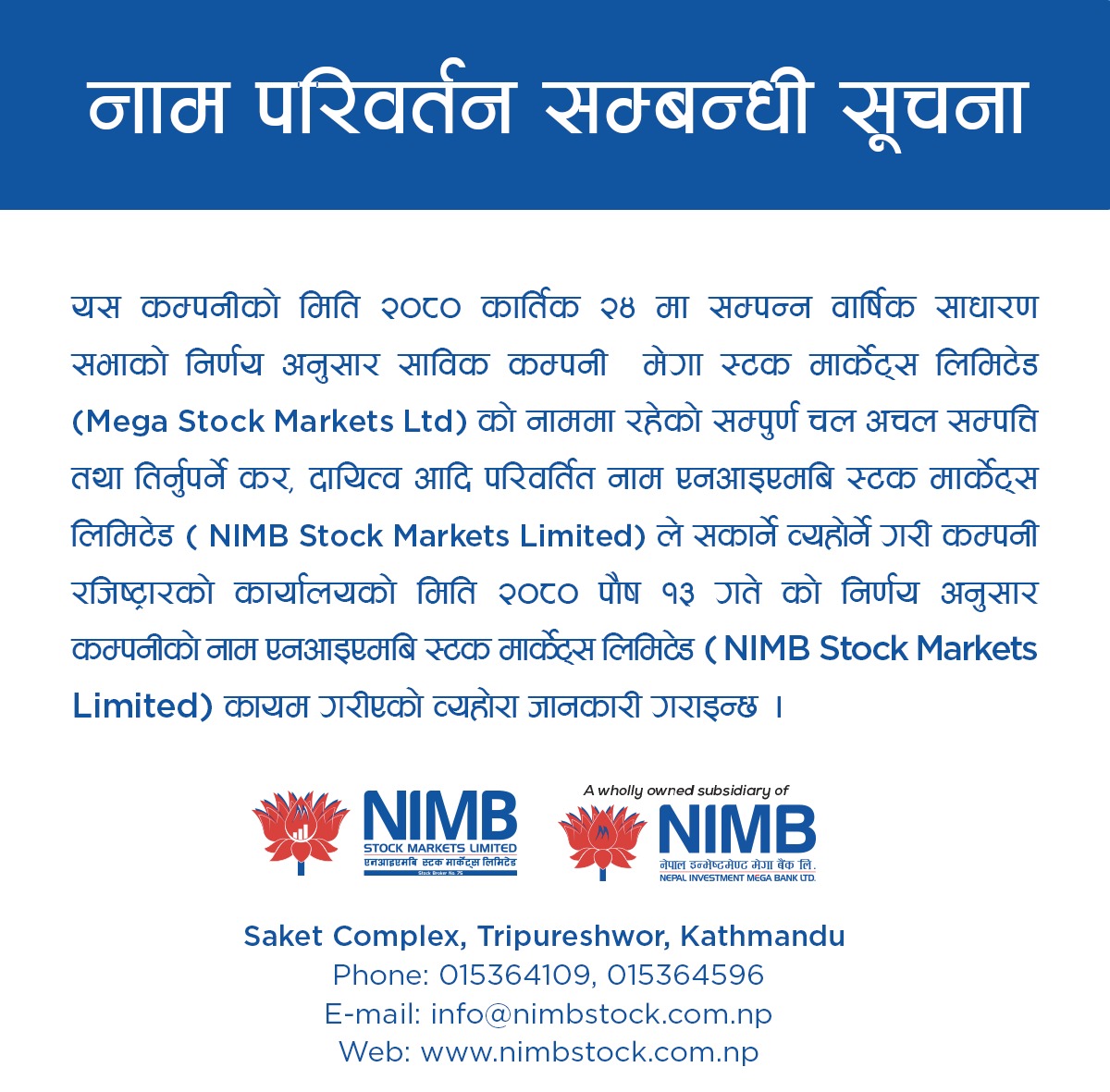
Name Change Notice!!
The Annual General Meeting was held on 24th Kartik, 2080. As per the decision made, we are pleased to inform you that ‘Mega Stock Markets Limited’ has undergone a significant
NIMB Stock Markets Limited
FAQs
You can open an online broker account through the given link, which is https://tms75.nepsetms.com.np/client-registration
The mandatory documents to upload are as follows:
All documents should be in .JPG format.
The mandatory documents to upload are as follows:
All documents should be in JPG format.
For your convenience, we have arranged to open a broker account through the branch offices of Nepal Investment Mega Bank across the country. You can easily become a customer of broker number 75 by going to the nearest branch of NIMB. And you can do business by completing the process as per the rules.
If you have any problem in dealing with mega stock, you can contact this company’s phone number 015364109/5364596 and talk to the relevant department without any hesitation.
A depository facilitates the holding and/or transacting securities in book entry form. In other words, a depository takes the ownership guarantee of the shareholders by holding those securities and other market instruments which are listed in the secondary market, distributed or allotted and can be deposited into the electronic form. The investor has to open a demat account to avail the services of depository. Additionally, the depository maintains the record in the account of the investors.
A Depository Participant (DP) is an agent appointed by a depository to offer depository services to all investors. To be an authorized DP, the institution shall be a Bank or Financial Institution, Stock Broker, Registrar and Transfer Agent, custodian or entity prescribed by the Securities Board of Nepal.
The Beneficiary Owner (BO) is the person who holds a DEMAT account.
The DEMAT account number of Beneficiary Owner is known as BO Id. It is a 16-digit unique identification number provided by Central Depository while opening a DEMAT account.
Dematerialization is the process of converting physical or paper-based shares/bond debenture/mutual funds into digital or electronic form. The main aim of digitization is to smooth the process of buying, selling, transferring and holding shares.
Margin Lending is a type of loan that allows you to borrow money to invest, by using your existing shares, managed funds and/or cash as security. It is a type of gearing, which is borrowing money to invest.
Margin lending allows you to borrow against your existing investments like shares or funds. Your borrowing amount is determined by your financial position and the Loan to Value Ratio (LVR), which is the loan amount divided by your investment value. If your investment value drops and exceeds the maximum LVR, a ‘margin call’ happens. You must then reduce the loan, add more security, or sell part of your investment to lower the LVR. Remember, your investment’s value can be used to repay the loan. Watch your investments closely to act during a margin call.
A benefit of margin lending is the opportunity it provides to increase your investment exposure. Essentially, borrowing allows you access to more funds, giving you the potential to make additional investments you may not have been able to make otherwise. This can magnify market exposures with the potential to increase returns or allow new purchases to diversify your existing portfolio. Margin lending can also have tax benefits. For example, you may be able to claim the interest on your loan as a tax deduction.
Margin lending introduces significant risks due to borrowing to invest. If your investments decline, you not only face losses but also need to repay the loan. While it can amplify gains, it equally amplifies losses, and positive returns must exceed borrowing costs that vary with interest rates.
A stock dealer is a financial professional who trades stock shares and makes a profit by selling them for more than they bought them.
The over-the-counter market—commonly known as the OTC market—is where securities that aren’t listed on the major exchanges are traded. Stocks and bonds that trade on the OTC market are typically from smaller companies that don’t meet the requirements to be listed on a major exchange.
Following five years of ownership of First shares, promoter shares may be sold. After receiving approval from Nepal Rastra Bank, trading is permitted in the area where share ownership is greater than 2%. To begin with, you must notify the company if you wish to purchase or sell founder shares. Along with publishing a 35-day notice, the corporation disseminates information among the original owners of its own company. Only after notifying the Nepal Securities Board and gaining the NEPSE’s clearance for the transaction, and after identifying the buyer and seller, can founder shares be acquired or sold. According to the company’s requests, the required paperwork and information will be provided.
A mutual fund is a company that pools money from many investors and invests the money in securities such as stocks, bonds, and short-term debt. The combined holdings of the mutual fund are known as its portfolio. Investors buy shares in mutual funds. Each share represents an investor’s part ownership in the fund and the income it generates.
Broker fees are one of the costs of buying or selling a security, especially in competitive markets. They can range from a few hundred to thousands, depending on the type and value of the transaction. However, broker fees are set in fixed, and you can’t negotiate.
Capital gain tax rate is 10% for Corporate and 7.5% for short term investor and 5% for long term investor respectively on profit.
Equity Shares
S.no. | Transaction Amount | Commission* |
1 | Rs. 50,000 or less | 0.4% or Rs. 10 whichever is higher |
2 | Rs. 50,001 to Rs. 500,000 | 0.37% |
3 | Rs. 500,001 to Rs. 2,000,000 | 0.34% |
4 | Rs. 2,000,001 to Rs. 10,000,000 | 0.3% |
3 | Above Rs. 10,000,000 | 0.27% |
* Total commission comprises of 79.4% broker commission, 20% exchange commission (NEPSE) and 0.6% regulatory fee (SEBON)
An additional 0.015% SEBON transaction is applicable on the transaction amount.
Additional Rs. 25 per stock per transfer day is applicable as DP transaction charge to be paid to DP.
For Securities other than mentioned above, Closed-end fund or mutual fund units and Other Securities
S.no. | Transaction Amount | Commission* |
1 | Rs. 500,000 or less | 0.15% or Rs. 10 whichever is higher |
2 | Rs. 500,001 to Rs. 5,000,000 | 0.12% |
3 | Above Rs. 5,000,000 | 0.10% |
*Total commission comprises of 79.4% broker commission, 20% exchange commission (NEPSE) and 0.6% regulatory fee (SEBON)
An additional 0.010% SEBON transaction fee is applicable on the transaction amount.
Additional Rs. 25 per stock per transfer day is applicable as DP transaction charge to be paid to DP.
S.no. | Transaction Amount | Commission* |
1 | Rs. 500,000 or less | 0.10% or Rs. 10 whichever is higher |
2 | Rs. 500,001 to Rs. 5,000,000 | 0.05% |
3 | Above Rs. 5,000,000 | 0.02% |
*Total commission comprises of 79.4% broker commission, 20% exchange commission (NEPSE) and 0.6% regulatory fee (SEBON)
An additional 0.010% on corporate debenture and 0.005% on other securities as SEBON transaction fee is applicable on the transaction amount.
Additional Rs. 25 per stock per transfer day is applicable as DP transaction charge to be paid to DP.
We offer client accounting and provide with high-quality services and dependable investment options.


The Annual General Meeting was held on 24th Kartik, 2080. As per the decision made, we are pleased to inform you that ‘Mega Stock Markets Limited’ has undergone a significant


